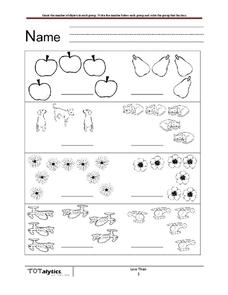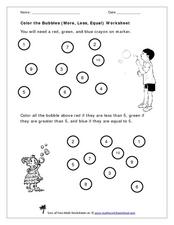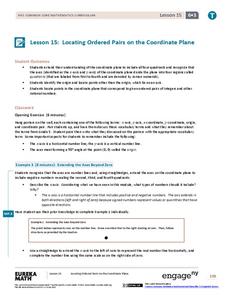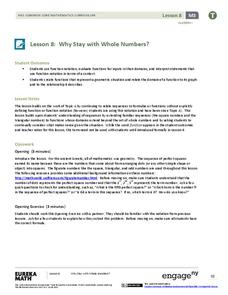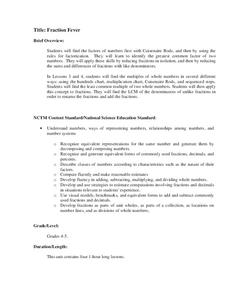Curated OER
Math Review for Grade 1 (1.1)
In this math review for grade 1 (1.1) worksheet, 1st graders answer 25 multiple choice questions in a standardized test format reviewing skills of addition, patterns, and number order.
Curated OER
Adding and Subtracting Integers
Sixth and seventh graders solve 10 different problems that include various integers. First, they determine whether each equation in the first five problems is true or false. Then, pupils solve the last five problems by adding or...
Curated OER
Number Line Locomotion
Here is a great lesson that incorporates movement into academic learning. Students improve addition subtraction skills by using number lines and locomotor movement.
Curated OER
Counting: Skip Counting
For this skip counting worksheet, students solve 10 problems that require them to skip count as indicated in the instructions for each problem set. Students fill in 9 blanks in each set. The range of numbers on this worksheet is 1-102.
Curated OER
Counting: Skip Counting 2
In this skip counting worksheet, learners solve 5 problems that require them to skip count as indicated in the instructions for each problem set. Students fill in 9 blanks in each set. The range of numbers on this worksheet is 1-100.
Curated OER
Estimating Solutions to Word Problems
Learners use estimation to determine the answers to word problems by rounding whole numbers. In this estimation lesson plan, pupils compare and contrast solutions using the best answer.
Curated OER
Learning about Fibonacci
In this learning about Fibonacci worksheet, students read about Leonardo Fibonacci and his contribution to mathematics, then study the pattern of Fibonacci numbers, in math and in nature.
Curated OER
Counting Objects
What an easy way to practice counting and comparing numbers! Learners examine four sets of drawings, each with two types of objects pictured. They count each object, writing the number below. Then, they color in the item with fewer...
Curated OER
Trick-or-Treat
Who has the most candy? Kids often have candy on the brain, so get them to learn in the process! Here is a great counting worksheet for Halloween week. Learners compare candy stashes between four pairs of kids. They count each stash,...
Curated OER
Greater Than, Less Than 20
Learners compare number sets. They study each number pair then compare them using the greater than, less than, or equals symbols. There are 10 problems to solve.
Curated OER
Amanda Bean's Amazing Dream
Use the book Amanda Bean's Amazing Dream to inspire your learners to solve and create multiplication word problems. After listening to the story, they solve two "which is more" problems. They explain their thinking with images,...
Curated OER
Color the Bubbles (More, Less, Equal)
Combine coloring and number comparisons with your youngsters. They use color coding to identify numbers that are less than, greater than, or equal to five. The 20 numbers are enclosed in bubbles, making this more of a fun...
Curated OER
Mentally Add and Subtract 10 or 100
Find the missing digits in these number sequences. Each of the ten has one missing number and scholars must figure out what it is. Here's the pattern: all of these sequences involve counting by 10s. Learners add or subtract 10 to...
Curated OER
Fractions And Integers Review
Investigate the concepts of fractions and integers in order to review for a future assessment. The teacher reviews the major concepts with the class and provides help throughout the lesson as needed. Math young scholars work together in...
Curated OER
Equal or Not Equal
Tiny mathematicians count the number of shapes (up to 8) in pairs of object groups and identify the sets as equal or not equal. Five practice problems. They also draw 2 groups of shapes that are not equal. A focused tool that...
Curated OER
Greater Than, Less Than, and Equal To
In this number comparisons instructional activity, 1st graders use the number line to help them compare the numbers in each set. Students circle the words greater then, less than, or equal to for the 19 problems.
Curated OER
Cracking the Code: Sequencing
You've just found a teaching template ready to use, all you have to do is personalize it to fit your class. It contains five number sequences or patterns for learners to complete, a place for your name, and a "prize." Tip: This template...
Curated OER
Ordering Fitness Fun
Young scholars participate in a practice activity in which they must remember the order of the numbers 1-10 and then 10-20. In teams, they participate in a relay race in which they must place number cards in the correct order on a...
Computer Science Unplugged
Battleships—Searching Algorithms
How does a computer perform a search in order to find data? The lesson begins with a demonstration on finding one number out of 15. Pairs then play three games of Battleship by using different search techniques. The lesson...
EngageNY
Locating Ordered Pairs on the Coordinate Plane
Four quadrants, four times the fun. Future mathematicians learn the terminology associated with the coordinate plane and how to plot points in all four quadrants. A worksheet tests their understanding of the material in the 16th...
EngageNY
Why Stay with Whole Numbers?
Domain can be a tricky topic, especially when you relate it to context, but here is a lesson that provides concrete examples of discrete situations and those that are continuous. It also addresses where the input values should begin and...
National Security Agency
Fraction Fever
This unit on fractions allows for upper-aged elementary learners to explore ways to find the greatest common factor and least common multiple of two numbers. Ultimately, young mathematicians will be able to identify equivalent fractions,...
Willow Tree
Graphing
So many methods and so little time! The efficient method of graphing a linear equation depends on what information the problem gives. Pupils learn three different methods of graphing linear equations. They graph equations using...
Cru High School
Games / Icebreakers
Twenty-three, fun-filled activities make up a list of icebreakers designed to familiarize class members with one another, and add a sense of community to the classroom.







